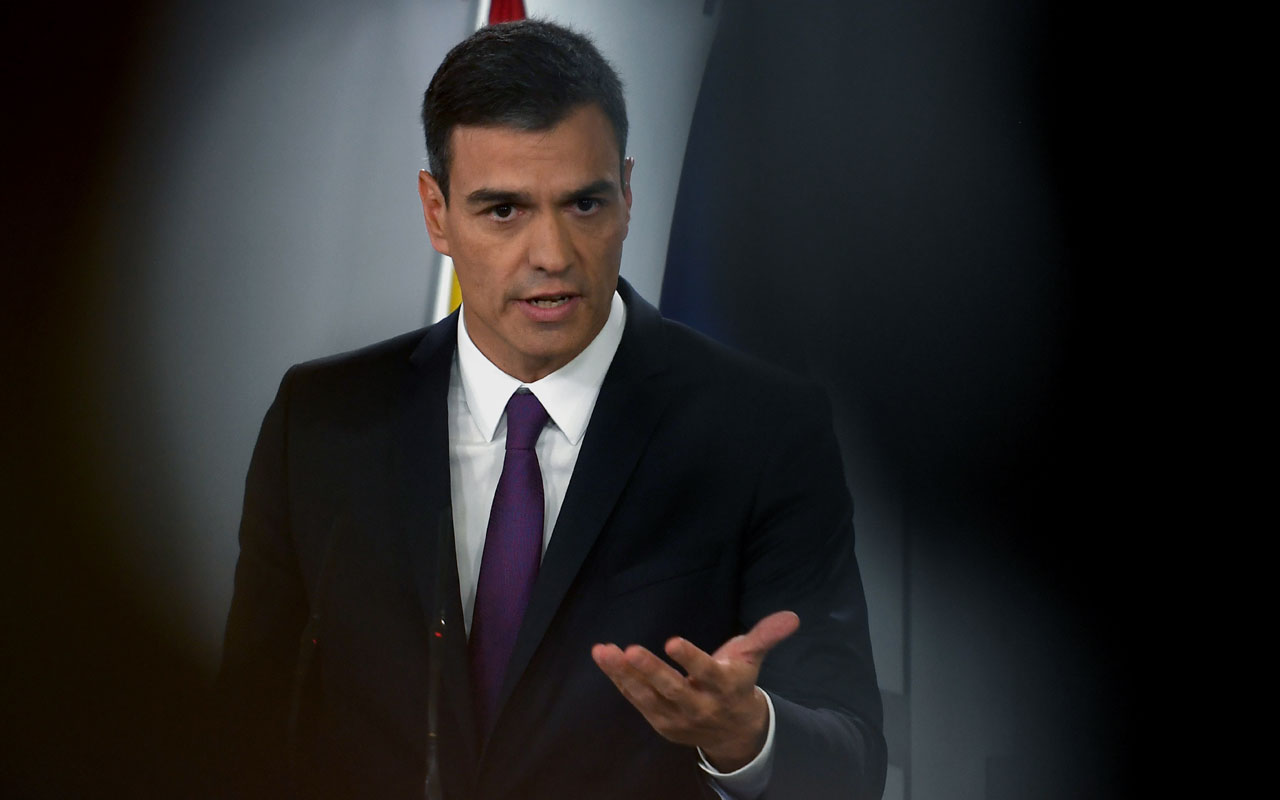 |
| (FILES) In this file photo taken on August 03, 2018 Spanish Prime Minister Pedro Sanchez gives a press conference after a cabinet meeting at the Moncloa Palace in Madrid on August 3, 2018. Spanish Prime Minister Pedro Sanchez reacted angrily on September 13, 2018 after accusations of plagiarism in his doctoral thesis, in a country shaken by a scandal over the questionable diplomas of political figures. / AFP PHOTO / PIERRE-PHILIPPE MARCOU |
Spanish Prime Minister Pedro Sanchez vowed Monday to reform the constitution to end judicial privileges enjoyed by politicians, judges, royals and other top officials which can shield them from corruption charges.
The Socialist prime minister said the measure was needed “to restore people’s confidence in politics” in a country which has been rocked by a string of corruption scandals in recent years.
Sanchez announced the measure which will make it easier for politicians to be prosecuted at a Madrid event marking 100 days since he toppled his conservative Popular Party predecessor in a no confidence vote amid a long-running graft scandal.
Under a system of judicial privileges known as “aforamiento,” Spain’s lawmakers and other top officials benefit from a system of judicial privileges meant to protect them from spurious attacks and which means they can only be tried by Spain’s Supreme Court, the country’s top court.
Spain’s 1978 constitution originally granted the privileges to the prime minister and a handful of other top officials but it had been extended over the years to include judges, public prosecutors, police and others.
Some 250,000 people are covered by the system, including five members of Spain’s royal family, the head of Spain’s Supreme Court, Carles Lesmes, said last year.
Spain has been fit by a series of graft scandals affecting political parties from across the spectrum, the royal family, footballers and even unions.
The anger over graft has led to the rise of two new parties, far-left Podemos and centre-right Ciudadanos, which have vowed to stamp it out.
Sanchez’s Socialist party has only 84 seats in Spain’s 350-seat lower house of parliament, the smallest number for a government since the country returned to democracy following dictator Francisco Franco’s death in 1975.
But the planned constitutional reform would need to be approved by three-fifths of the assembly, as well as three-fifths of the senate, Spain’s upper house, meaning Sanchez will need the support of the Popular Party which he ousted from power in June.
If all worked together, “this reform would come into effect just 60 days after it introduced,” the prime minister said.
AFP
The Socialist prime minister said the measure was needed “to restore people’s confidence in politics” in a country which has been rocked by a string of corruption scandals in recent years.
Sanchez announced the measure which will make it easier for politicians to be prosecuted at a Madrid event marking 100 days since he toppled his conservative Popular Party predecessor in a no confidence vote amid a long-running graft scandal.
Under a system of judicial privileges known as “aforamiento,” Spain’s lawmakers and other top officials benefit from a system of judicial privileges meant to protect them from spurious attacks and which means they can only be tried by Spain’s Supreme Court, the country’s top court.
Spain’s 1978 constitution originally granted the privileges to the prime minister and a handful of other top officials but it had been extended over the years to include judges, public prosecutors, police and others.
Some 250,000 people are covered by the system, including five members of Spain’s royal family, the head of Spain’s Supreme Court, Carles Lesmes, said last year.
Spain has been fit by a series of graft scandals affecting political parties from across the spectrum, the royal family, footballers and even unions.
The anger over graft has led to the rise of two new parties, far-left Podemos and centre-right Ciudadanos, which have vowed to stamp it out.
Sanchez’s Socialist party has only 84 seats in Spain’s 350-seat lower house of parliament, the smallest number for a government since the country returned to democracy following dictator Francisco Franco’s death in 1975.
But the planned constitutional reform would need to be approved by three-fifths of the assembly, as well as three-fifths of the senate, Spain’s upper house, meaning Sanchez will need the support of the Popular Party which he ousted from power in June.
If all worked together, “this reform would come into effect just 60 days after it introduced,” the prime minister said.
AFP
In this article:
